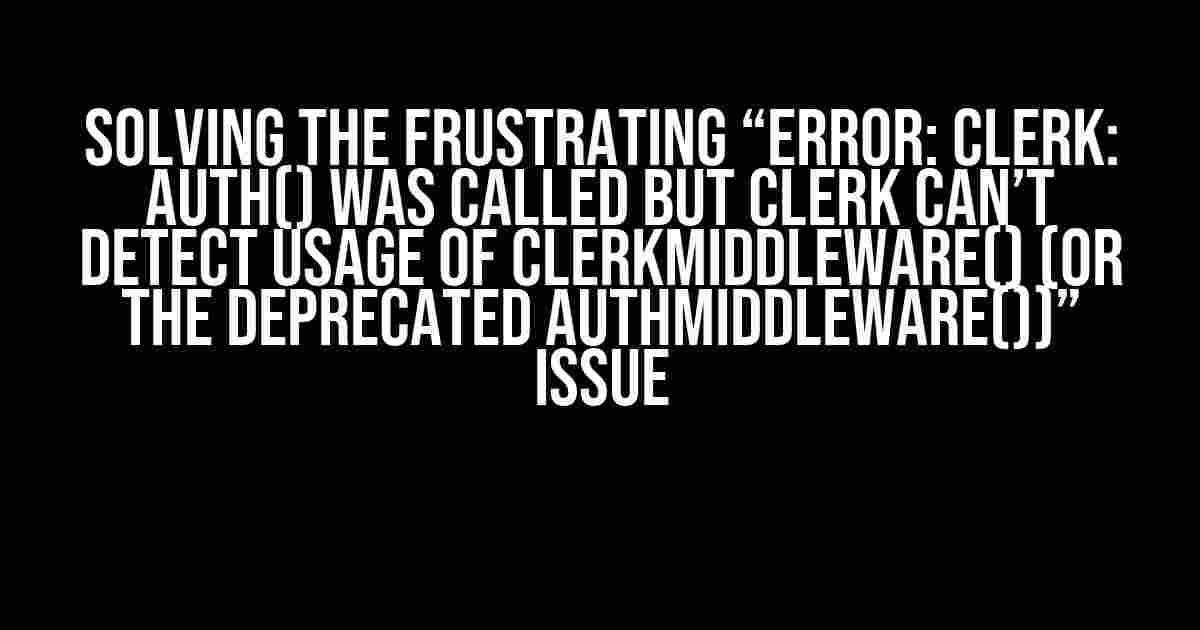If you’re reading this, chances are you’re stuck with a pesky error message that’s got you scratching your head. Don’t worry, friend, you’re not alone! The “Error: Clerk: auth() was called but Clerk can’t detect usage of clerkMiddleware() (or the deprecated authMiddleware())” issue is a common gotcha that can be tricky to resolve. But fear not, for we’re about to dive into the depths of this problem and emerge victorious on the other side.
What’s Going On?
Before we start fixing things, let’s take a step back and understand what’s happening. Clerk is a popular authentication library for Next.js, and it provides a simple way to manage user sessions. When you call the `auth()` function, Clerk expects you to have integrated its middleware into your Next.js app. The error message suggests that Clerk can’t find the middleware, which is why it’s throwing a tantrum.
Why Does This Error Happen?
There are a few reasons why you might encounter this error:
- Mismatched Clerk versions**: You might be using a mismatched version of Clerk, which can cause compatibility issues. Make sure you’re using the same version of Clerk throughout your project.
- Missing or incorrect middleware setup**: Failing to set up the Clerk middleware correctly can lead to this error. We’ll cover the setup process in detail later on.
- Conflicting plugins or libraries**: Other plugins or libraries might be interfering with Clerk’s functionality. Identify any potential conflicts and address them accordingly.
Solving the Error: A Step-by-Step Guide
Now that we’ve covered the reasons behind the error, let’s get to fixing it! Follow these steps carefully to resolve the “Error: Clerk: auth() was called but Clerk can’t detect usage of clerkMiddleware() (or the deprecated authMiddleware())” issue:
- Verify Clerk Version**: Double-check that you’re using the correct version of Clerk. Run the following command in your terminal:
npm ls @clerk/clerk-nextjsIf you’re using a mismatched version, update Clerk to the latest version:
npm install @clerk/clerk-nextjs@latest- Set up Clerk Middleware**: Make sure you’ve set up the Clerk middleware correctly in your Next.js app. Create a new file called `middleware.js` in your project’s root directory:
touch middleware.jsAdd the following code to the `middleware.js` file:
import { NextApiRequest, NextApiResponse } from 'next';
import { clerkMiddleware } from '@clerk/clerk-nextjs';
export default clerkMiddleware();
- Integrate Middleware with Next.js**: Update your `next.config.js` file to include the Clerk middleware:
module.exports = {
// ... other config options ...
middleware: [
'./middleware.js',
],
};
Restart your Next.js development server to apply the changes:
npm run dev- Verify auth() Call**: Ensure that you’re calling the `auth()` function correctly in your code. Here’s an example:
import { auth } from '@clerk/clerk-nextjs';
function LoginPage() {
const { signIn } = auth();
return (
<div>
<button onClick={() => signIn()}>Sign In</button>
</div>
);
}
Troubleshooting Common Issues
If you’ve followed the steps above and still encounter issues, here are some common problems to look out for:
| Issue | Solution |
|---|---|
| Error persists after updating Clerk version | Try deleting the `node_modules` directory and running `npm install` again to ensure a clean installation. |
| Clerk middleware not detected | Verify that the `middleware.js` file is in the correct location and that the `next.config.js` file is correctly configured. |
| auth() function not working | Check that you’ve imported the `auth()` function correctly and that you’re calling it in the correct context. |
Conclusion
The “Error: Clerk: auth() was called but Clerk can’t detect usage of clerkMiddleware() (or the deprecated authMiddleware())” issue can be frustrating, but it’s relatively easy to resolve once you understand the underlying causes. By following the steps outlined in this article, you should be able to integrate Clerk correctly and get back to building your Next.js app.
Remember to stay calm, patient, and methodical when troubleshooting. If you’re still stuck, don’t hesitate to reach out to the Clerk community or seek help from a fellow developer. Happy coding!
Frequently Asked Question
Stuck with the Clerk error? Don’t worry, we’ve got you covered! Check out these frequently asked questions to resolve the issue.
What does the Clerk error “auth() was called but Clerk can’t detect usage of clerkMiddleware() (or the deprecated authMiddleware())” mean?
This error occurs when you call the auth() function in Clerk without properly setting up the clerkMiddleware() in your application. It’s like trying to unlock a door without the right key! Clerk can’t detect the middleware, so it throws an error.
Is authMiddleware() still usable?
No, authMiddleware() is deprecated and should not be used. It’s like trying to use an outdated map to navigate a new city! Instead, use clerkMiddleware() to ensure compatibility and avoid errors.
How do I fix the error by setting up clerkMiddleware()?
To fix the error, you need to wrap your application with the clerkMiddleware() function. This typically involves importing Clerk and wrapping your app with the middleware in your main application file. For example, in Next.js, you would add it to your ‘_app.js’ file.
Do I need to add clerkMiddleware() to every page or route?
No, you only need to add clerkMiddleware() to your main application file. Think of it as adding a single key to unlock all the doors in your application! Once you’ve set it up, Clerk will be able to detect it and work correctly across all pages and routes.
What if I’m still getting the error after setting up clerkMiddleware()?
If you’re still getting the error, double-check your implementation of clerkMiddleware(). Make sure you’ve imported Clerk correctly and wrapped your app with the middleware. Also, verify that you’re using the latest version of Clerk. If the issue persists, you can try seeking help from the Clerk community or checking the official documentation for further guidance.





